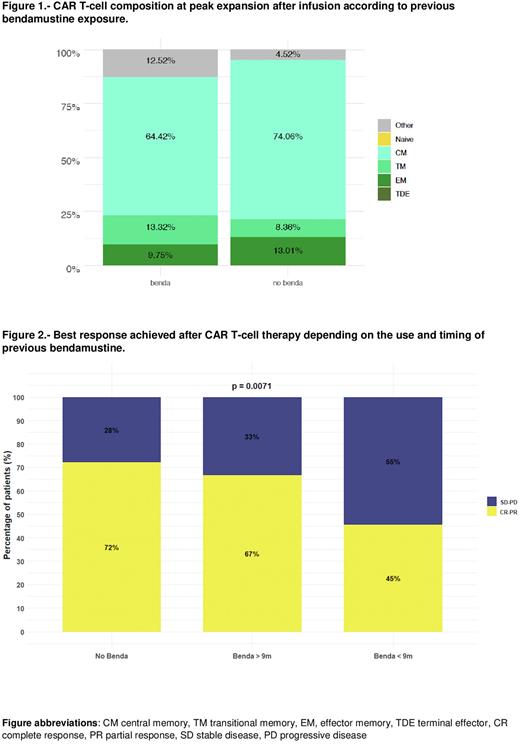Abstract
Introduction: Since chimeric antigen receptor (CAR) T-cells are produced from circulating autologous T-lymphocytes, the final composition of each product is highly dependent on the number and fitness of these T-cells. A potential deleterious effect of prior bendamustine (benda) on CAR T-cell production has been proposed due to its lymphotoxic effect. Based on this, consensus documents suggest avoiding benda in potential CAR-T candidates. However, there is scarce data regarding the impact of previous benda exposure on T-cell kinetics and clinical outcomes in patients treated with CD19-targeted CAR T-cell therapies.
Methods: We conducted a retrospective, multicenter, international study including patients with relapsed/refractory (R/R) large B-cell lymphoma (LBCL) treated at 7 sites with commercially available CAR T-cell products until June 2022. We analyzed the baseline characteristics, response rates and survival outcomes. A univariate logistic regression model was carried out to study the association between different variables with previous benda therapy. Progression-free survival (PFS) and overall survival (OS) were calculated from time of infusion. The maximum log-rank method was used to select the best cutoff for the time between last bendamustine dose and apheresis with an impact on OS. Finally, we carried out an analysis of circulating CAR T-cells by flow cytometry in benda-treated patients from 2 centers (n=15) and compared them with benda-naïve matched controls (1:1) based on IPI score (0-2 vs 3-5), age (±10 years) and type of construct (axi-cel vs. tisa-cel).
Results: We included 370 patients, of which 74 (20%) had received bendamustine-containing regimens before apheresis. The median time between last benda dose and apheresis was 226 days (IQR 67-606) and median total dose was 1050 mg (IQR 277-1800). Regarding baseline characteristics, patients in the benda group were older (median years, 66 vs 61) and had a higher ECOG score (ECOG >1, 16% vs 4%) than benda-naïve patients. Median follow-up from infusion was 19.4 months (CI95% 13.7 - 30.8 months).
First, we analyzed the impact of previous benda on several parameters at apheresis and after treatment. Patients with prior exposure to benda had lower median absolute lymphocyte counts (0.7 x109/L vs 1.0 x109/L, p=0.004), CD3+ cells (0.5 x109/L vs 0.7 x109/L, p=0.006) and platelets (125 x109/L vs 179 x109/L, p=0.004) at apheresis than benda-naïve patients. Patients without previous benda exposure showed better response rates (overall, complete - CR-) to CAR T-cell therapy than those in the benda group (72%, 51% vs 57%, 41%), respectively (p=0.018). Median PFS for the full cohort was 4.4 months, 3.2 and 4.9 months in the benda and benda-naïve cohorts, respectively (p=0.3). Median OS was 18.6 months for the full cohort, 20.1 and 18.6 months in the benda and benda-naïve cohorts, respectively (p=0.31). There were no differences in the incidence or severity of cytokine release syndrome (CRS) and neurotoxicity after infusion.
Regarding CAR-T characterization, patients with prior benda showed a lower (14.4 vs 28.6 cells/mL) and more delayed (17 vs. 13 days) absolute CAR T-cell peak expansion after infusion than benda-naïve controls. Regarding CAR T-cell subpopulations, there was a higher proportion of central memory and effector memory CAR+ T-cells in the benda-naïve group, compared with the benda group (Figure 1).
Given the wide variability in the time from last benda dose to apheresis, we then focused our analysis on patients receiving benda within the last 9 months before T-cell collection (benda<9m), as described in Methods. The values of CD3+ lymphocytes and platelets at apheresis were similar between benda <9m and benda >9m patients. The overall (CR) response rate was lower in the benda <9m than in the benda >9m group: 45% (33%) and 67% (50%), respectively (p=0.0071) (Figure 2). Similarly, patients in the benda <9m cohort had a lower median PFS than those in the benda >9m (1.5 vs. 7.1 months, p=0.02). Probability of OS and incidence of CRS and neurotoxicity were similar, irrespective of the time from last benda dose.
Conclusions: Bendamustine-containing regimens before CAR T-cell therapy may have a negative impact on T-cell numbers and composition at apheresis and on CAR T-cell expansion. LBCL patients with recent exposure (<9 months) to benda have worse outcomes after CAR T-cell therapy than patients with an earlier exposure.
Disclosures
Iacoboni:NOVARTIS, KITE/GILEAD, BMS/CELGENE: Consultancy; NOVARTIS, KITE/GILEAD, BMS/CELGENE, ASTRAZENECA, ROCHE, ABBVIE, JANSSEN, MILTENYI: Honoraria. Jalowiec:Kite Gilead: Honoraria. Kwon:Novartis: Consultancy, Honoraria, Other: Support for attending meetings and/or travel; Gilead: Consultancy, Honoraria, Other: Support for attending meetings and/or travel; BMS: Consultancy. Rejeski:Novartis: Honoraria; Kite/Gilead: Other: Travel Support, Research Funding. Roddie:Kite Gilead: Honoraria, Membership on an entity's Board of Directors or advisory committees; Novartis: Honoraria, Membership on an entity's Board of Directors or advisory committees; BMS: Honoraria, Membership on an entity's Board of Directors or advisory committees. Carpio:Takeda: Consultancy; Regeneron Pharmaceuticals, Inc.: Consultancy; BMS: Honoraria; Novartis: Honoraria; Gilead: Honoraria; AstraZeneca: Honoraria. Bastos-Oreiro:Roche: Consultancy, Research Funding, Speakers Bureau; KITE/GILEAD: Consultancy, Honoraria; NOVARTIS: Speakers Bureau; INCYTE: Consultancy, Speakers Bureau; JANSSEN: Speakers Bureau. Subklewe:Roche: Consultancy, Research Funding; Novartis: Consultancy, Speakers Bureau; Janssen: Consultancy, Speakers Bureau; Seagen: Research Funding; Morphosys: Research Funding; Miltenyi Biotech: Research Funding; Takeda: Other: Travel support; Gilead: Consultancy, Research Funding, Speakers Bureau; Celgene/BMS: Consultancy, Speakers Bureau; Amgen: Consultancy, Research Funding, Speakers Bureau; Pfizer: Consultancy; Seattle Genetics: Research Funding; Bristol-Myers Squibb: Research Funding. Barba:Amgen: Honoraria; Gilead: Honoraria; BMS: Honoraria; Novartis: Honoraria; Pfizer: Honoraria.
Author notes
Asterisk with author names denotes non-ASH members.


This feature is available to Subscribers Only
Sign In or Create an Account Close Modal